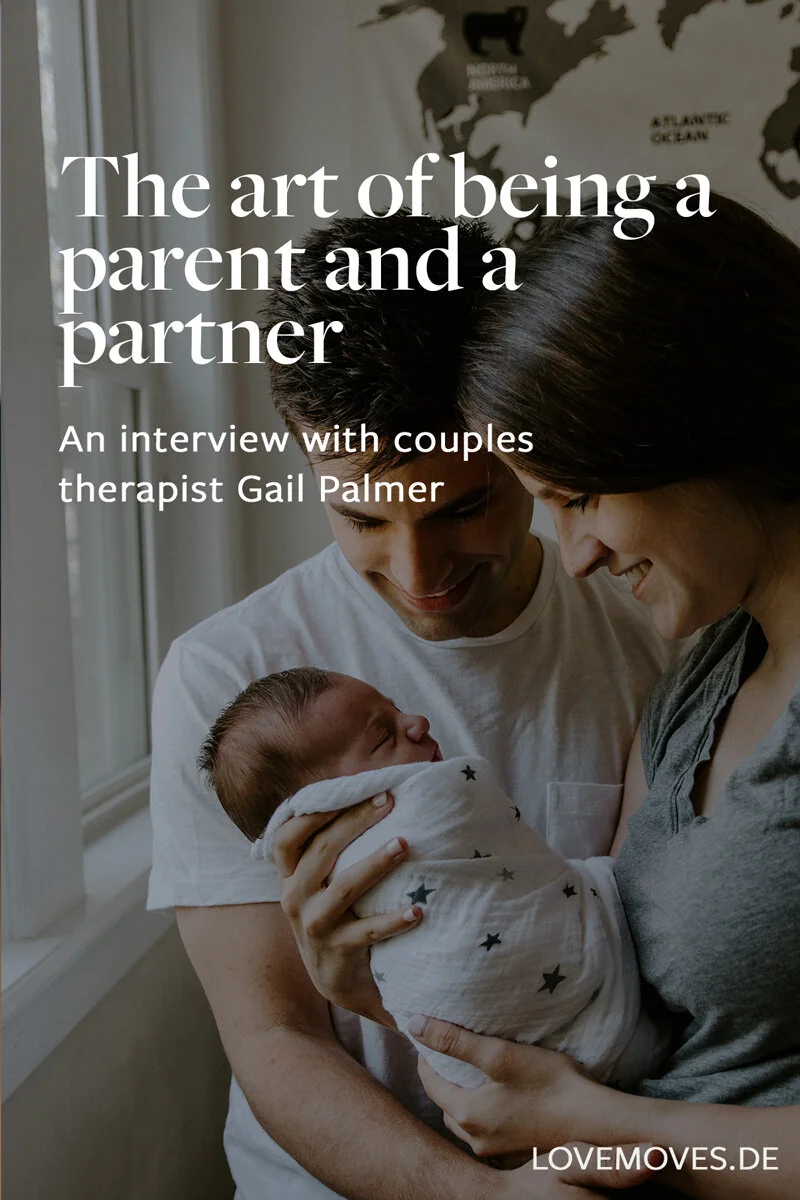The art of being a parent and a partner: Interview with Couple Therapist Gail Palmer
Pin this article about dating in your 30s now and read it later
What does it mean to lose your emotional balance as a partner? Why do we act in opposition to our good intentions? And how can we juggle being a parent and a partner at the same time? In this interview, Gail Palmer gives insight into her experience as a Emotional Focused Therapist for Couples and Families.
Gail Palmer works over 20 years as a trainer for EFFT and even longer as a counsellor. Having so much experience, it’s no wonder that she is the co-founder of the Ottawa Couple and Family Institute (OCFI) and co-director of ICEEFT. Working with families is a priority to her, as shift and transformation happens there.
If you are a therapist yourself, I highly recommend her workshop on EFFT. Gail Palmer talks about the conceptual underpinning of EFFT, differences in working with families, how to conceptualize attachment and look at negative patterns, and how to work with emotions. All of these things can be tricky from time to time, so feel free to deepen your therapeutic knowledge.
If you could turn back in time, what would you love to tell your younger self about what you’ve learned through being a therapist?
Gail Palmer: Change takes time. We as human beings are vulnerable and when we’re vulnerable, we protect ourselves in ways that may look or are hurtful to others. The majority of us come from a place of good intention and we all have a desire to be loved and accepted. But oftentimes this doesn’t show up because of our own vulnerabilities and fears. I see my job today as to try to understand, what leads people to act in opposition to their intention.
How do our vulnerabilities affect us as parents?
Gail Palmer: Parents are in a position of power, but they don’t necessarily have all the answers. Parents can lose their emotional balance and create more difficulties with good intentions. I can give you an example: A parent sees their child in trouble and has the desire to protect their child –by offering solutions and trying to fix and ultimately making things worse. Parents’ solutions can lead to their child feeling rejected and not accepted. and the child rejects what the parent is offering. The parent tries harder and a negative cycle starts.
We as therapists can interrupt this pattern by helping parents become more aware of their blocks and help them process those blocks. Once parents have self-awareness they can choose different ways to respond and can begin to see their child and what they need in a clearer way. Hence, they can react in a way that is emotional accessible, responsive and engaged. Which is what we do in EFT and EFFT, help build secure attachment bonds.
What can parents do so that children feel secure attachment?
Gail Palmer: Dan Siegel, writes, “Connect before you correct” or in other words, “Validate before you educate.” A secure attachment bond allows parents to have influence and become the stronger and wiser other in the their child’s lives. In essence, to be the other that their child needs. Without this bond, family members are often caught in a negative pattern which limits safe connection. A secure relationship means that parents are visible to their children. They don’t have to be perfect, but rather emotionally available. Children need to see that their parents are interested in them, in their goals and interests. Parents don’t have to be perfect all the time, but simply open, trustworthy and predictable.
This is important, as parents oftentimes have the urge to be perfect.
Gail Palmer: As parents we believe that we need to do something. There is pressure on parents to have it all figured out. But that is the thing: Parents also learn from their children. The danger is that the child doesn’t actually get seen for what they need and that children want to validate and reassure their parents. The kid may naturally say: “I’m sorry Mom, you don’t have to … Moms can make mistakes, too.” But this is not the job of children.
In Emotional Focused Family Therapy we are not working with equal relationships and therefore track patterns where people have equal responsibility like in romantic relationships. The parent needs to be accessible and responsive to the child and therefore need to change first. The attachment bond between children and their parents are different then the connection between adult lovers. Infants and little children can’t survive without their parent but as adults we can survive,( but not really thrive), without a romantic partner.
How can we manage being romantic and sexual on the one side and being a parent on the other side?
Gail Palmer: Being a parent and a partner can feel like a conflict, like an “either-or”. Either we’re romantic and our relationship takes priority, or our kids take over our life and we don’t have romance anymore as a couple. Both aspects are important – it is an “And” and it’s not an “Or”. In Emotional Focused Therapy we start with where a couple is: When we start with parents as being a team, that could soften some of the blocks to being in a romantic relationship. Also as adults we also need comfort and protection and if we are not receiving that from our romantic partner, it is very difficult to give that to our child. The caregiving alliance between romantic partners, is a major factor in how children receive care and nurturance.
What do you tell parents who argue about the parenting “style”?
Gail Palmer: That it is normal. People can get stuck around the right or wrong way to be a parent. The therapist would map out a pattern with the parents and then insert how the pattern gets in the way of them showing up for their kids. If they get locked in a negative pattern around “who’s right – who’s wrong”- the question is, who gets dismissed? Children get dismissed. Because of their parental intent, there is motivation to get out of the right-wrong dynamic. As therapists, we’re in an arena where we can shift these dynamics and intergenerational transmission.
What do you mean with “intergenerational transmission”?
Gail Palmer: It can be that there is abuse or neglect in how the way parents were raised that led them to believe, that they are inadequate or that they will never be good enough or that that there is no one they can depend upon in tis world. These internal views of how the world is and how they see themselves translates to how they parent. For example, when their own children struggle or are unhappy, this can trigger their core belief that they are not good enough, or a sense of inadequate and they don’t know what to do. So they flounder in their wiser role and end up unwittingly repeating the same pattern that happened in their own family. In the face of the helplessness of not knowing wanting to do, they may become frustrated and blame the child , subjecting the child to violent language or behaviour or alternatively shut down and freeze and essentially abandon the child.
So EFFT is all about the parent experiencing themselves differently as a parent and then showing their child a different way of being in relationship, with love, understanding and acceptance
How do you as a therapist for EFT and EFFT provide healing to families and individuals?
Gail Palmer: In having new conversations that are intimate and vulnerable. The power of emotion is to shift perception and the way we interact. The deeper the felt experience, the deeper the shift in how we see ourselves and others. What creates healing is the parent’s or partner’s emotional presence. When the therapist helps people have new conversations with each other in session, they carry around new visions of their own lovability and the availability of others within themselves, The therapists repeats these new conversations again and again with the goal of rewiring our clients attachment system.
This change is not magic. It is a process that is structured, as we and Sue talk in our books. we have specific goals for therapy, that aren’t necessarily about solving problems. It is more about equipping families and to help them feel confident about their ability to face problems together. What we are doing is resourcing families, couples and individuals through the building of secure attachment.
What are the most important resources for families?
Gail Palmer: Again, it is about availability. It’s about these questions: “Do I have the confidence that my partner is available to me. That I can turn to them and they’ll respond.” Again, not perfectly, but there is this general sense that they’ll answer the call and it goes both ways with partners, and it goes one way with children. So that children have the confidence that their parents will respond.
We know that parents are not super human. They can’t be totally available to the kids 100% of the time without getting their tank filled, too. So parents should be able to turn to each other, or to another adult if they’re single. Caregiving for themselves is vital for all of us and equips us to to be able show up for our children and when it goes wrong and there is hurt, to repair that hurt and get back to the good.
Gail, thank you so much for your time and your answers!
Watch the full interview here: https://www.youtube.com/watch?v=xDwTK6OZ1d4
My name is Dr. Sharon Brehm and I offer systemic couple therapy and EFT couple therapy in Munich. My office for single and couple therapy is right in the center of Munich.
On my blog you will find all interessting thoughts about love and relationships: From interviews with other couple therapists, to information about emotions and relationship advice. Right now, I’m translating my articles step by step - if you are impatient, check the German version and have a look there :)
If you want to get to know me more, you can find me also on Instagram! If you prefer videos: I also have a few YouTube videos on my channel (though in German, but maybe this is the time to work on your language skills too ;) . You’d help me a lot, if you subscribe to it!
Photo credit: Kelly Sikkema via unsplash











